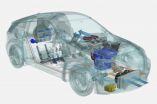(Press-News.org) ANN ARBOR, Mich. - One of the brain's main jobs is information processing - what is critical, however, is that information in the brain gets transferred to the right places at the right times.
Research on large-scale brain networks by the University of Michigan Medical School reveals that "hubs" in the brain - highly connected regions that like hubs of the airport system - tend to consistently attract information flow.
"Understanding how information transfer occurs in the brain is critical, especially if network hubs are taken off line by anesthesia, tumor or stroke," says senior study author George A. Mashour, M.D., Ph.D., Bert N. LaDu Professor of Anesthesiology and Director of the Center for Consciousness Science at the University of Michigan.
Mashour and study corresponding author UnCheol Lee, Ph.D., lead the UM's Center for Consciousness Science, one of the few centers in the world that examines the mechanisms and measurement of consciousness.
Their study findings, published in today's PLOS computational Biology, may provide a more straightforward approach to understanding how the overall architecture of the brain shapes information transfer in complex networks.
"It could help us better understand principles of information processing in the brain as the field maps out the structural and functional connections of different brain regions," says Lee, associate director of the Center for Consciousness Science.
The nation is in the early stages of an ambitious project called the BRAIN Initiative to map the structural and functional network of the healthy brain.
Scientists are expected to explore exactly how the brain enables the human body to record, process, utilize, store and retrieve vast quantities of information, all at the speed of thought.
"What is unique about this study," says lead author and physicist Joon-Young Moon, "is that we found a consistent relationship of hubs and information flow in many types of networks, including empirical brain networks reconstructed from human electroencephalogram.
"Hubs may not, as we commonly think, be control centers that send out information, but rather a critical destination where information is received and integrated."
The University of Michigan demonstrated the general relationship of hub status and information inflow using mathematical analysis, simulation studies in computational brain network models and brain electrical activity data collected from the EEGs of humans in the conscious and unconscious state.
INFORMATION:
Additional author: Stephanie Blain-Moraes, of the University of Michigan Department of Anesthesiology.
Reference: "General relationship of global topology local dynamics, and directionality in large scale brain networks," PLOS Computational Biology, April 13, 2015. DOI:10.1371/journal.pcbi.1004225
Funding: University of Michigan Department of Anesthesiology and National Institutes of Health
This news release is available in German.
How can a pleasant vehicle climate be achieved efficiently? Researchers at the Technische Universität München (TUM) pursued this question in the context of the research project Visio.M funded by the German Federal Ministry for Education and Research (BMBF) with a total of 7.1 million euro. The results of their research show that the potential of energy efficient air conditioning is all but exhausted. And this applies also to gasoline powered cars.
Inefficiency has its advantages, too: In the past, waste heat ...
Researchers are beginning to explore whether the genetics of patients who experience a placebo effect are different from those of patients who don't. It's well known that people can feel better if they believe they are receiving treatment, but the biological pathways involved are relatively unexplored. In a new review, publishing April 13 in Trends in Molecular Medicine, scientists at Beth Israel Deaconess Medical Center discuss what we know as well as possible ethical issues related to conducting genetic tests to determine whether a patient is a placebo responder.
"Understanding ...
A new strategy to rule-out and rule-in heart attacks in emergency departments will help physicians treat patients faster, found a clinical trial published in CMAJ (Canadian Medical Association Journal).
Acute myocardial infarction (MI) is a common cause of death and disability around the world. Early diagnosis is critical for treatment and survival.
Swiss and Spanish researchers conducted a clinical trial to determine whether a new technique, previously tested in a small pilot study, would be effective in determining whether a patient has had a heart attack. They enrolled ...
Family physicians have an important role in advising women about the benefits and risks of egg freezing, argues an analysis in CMAJ (Canadian Medical Association Journal).
"With growing public awareness of social egg freezing, Canadian women may increasingly approach physicians in search of information and advice about the procedure," writes Dr. Angel Petropanagos, Faculty of Medicine, Dalhousie University, Halifax, Nova Scotia, with coauthors Alana Cattapan, Françoise Baylis and Arthur Leader. "Family physicians are uniquely positioned at the front lines of medical ...
Melanoma cells become drug resistant by using surrounding healthy cells to provide a 'safe haven' from treatment, according to new research* published in Cancer Cell today (Monday).
Around half of melanomas are caused by a mutation in a gene called BRAF. Drugs called BRAF inhibitors treat these melanomas by targeting the faulty gene. But these cancers can quickly develop resistance to these targeted treatments.
Scientists at the Francis Crick Institute, funded by Cancer Research UK, and at the Cancer Research UK Manchester Institute have discovered that a side effect ...
A drug with the potential to reverse resistance to immunotherapy has been developed by scientists at the University of Southampton. It has shown great promise in pre-clinical models and will be available to patients with certain leukaemias and non-Hodgkin lymphomas in clinical trials later this year.
Targeted drugs made from engineered immune proteins - called monoclonal antibodies - have revolutionised treatment for several types of cancer in recent years. They work by sticking to specific proteins found on the surface of cancer cells, flagging them up to be killed by ...
BOSTON -Placebos have helped to ease symptoms of illness for centuries and have been a fundamental component of clinical research to test new drug therapies for more than 70 years. But why some people respond to placebos and others do not remains under debate.
With the advent of genomics, researchers are learning that placebo responses are modified by a person's genetics, a discovery that raises important new questions regarding the role of the placebo in patient care and in drug development: How many genetic biomarkers exist? Can the medical field harness the placebo ...
This news release is available in Spanish. Through his latest research, Javier Polavieja, a professor Sociology in the Social Sciences Department who holds a UC3M- Santander Named Chair of (Cátedra de Excelencia), has shown how European women who emigrate to other countries within the same continent take the cultural norms of their home countries with them. Those norms are decisive when it comes to determining their work behavior.
To reach this conclusion, the researcher compared the attitudes of over three thousand immigrant women from some twenty European countries ...
This news release is available in French.
Dancing the Argentine tango could have potential benefits for people at certain stages in the development of Parkinson's disease (PD), according to findings in a new study by researchers at the Montreal Neurological Institute and Hospital -The Neuro, McGill University and the Research Institute of the McGill University Health Centre. The study looked at changes in patients' motor abilities following a 12-week tango course, and is also the first study to assess the effect that tango has on non-motor symptoms.
The study looked ...
A single intravenous dose of the osteoporosis drug zoledronic acid improved bone mineral density in a group of frail elderly women living in nursing homes and long-term-care facilities, according to an article published online by JAMA Internal Medicine.
Nearly 2 million frail elderly Americans live in long-term care facilities and many of them have osteoporosis and bone fracture rates higher than less impaired elderly individuals. A hip fracture can be dire, decreasing mobility, independence and often leading to death, according to background in the study.
Susan L. ...

